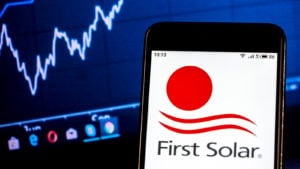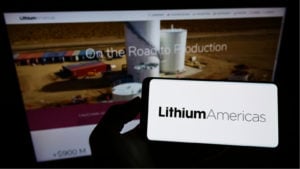The CHIPS and Science Act of 2022 and the Defense Production Act are two examples of why renewable energy stocks can make a comeback, thanks to increasing regulatory activity as we move into the next U.S. election cycle. The iShares Global Clean Energy ETF (NASDAQ:ICLN) is down around 11% this year, but both the Republican and Democrat camps can lead to a revival thanks to new policy proposals coming to light.
Analysts expect a “China shock 2.0” for U.S. stocks as China produces cheaper renewable energy goods. With cheaper renewable energy products flooding the market, the U.S. government must reconsider and promote domestic firms. This will cause other nations to respond, snowballing renewable energy stockpiles.
Brookfield Renewable Partners (BEP)

Brookfield Renewable Partners (NYSE:BEP) operates more than 550 solar facilities, 100 wind farms and 200 hydropower projects worldwide, insulating the business from country-specific headwinds, such as a hawkish Fed in the U.S.
Operating a global business gives it an advantage over any country-specific tailwinds, especially in North America and Asia-Pacific.
In its prior earnings announcement, EPS exceeded forecasts by 123%, exhibiting industry leadership. BEP Q4 2023 results include record FFO of $1.1 billion, proving its operational approach works despite resource cyclical uncertainties.
With late-year capacity additions, BEP gained 5,000 megawatts in 2023. The annual FFO increased by almost $100 million, as a result.
The corporation is adding a lot more projects to its pipeline of development, which now has approximately 18 gigawatts planned for the next three years.
Beyond profitability and predictions, BEP seeks high shareholder returns. In 2023, Brookfield Renewable aggressively repurchased 2 million units via the regular course issuer offer, confident in its growth strategy and share value. Buybacks accompany industry-leading 6% yields.
Finally, BEP is also heavily involved in M&A activities. By forming a partnership to purchase Westinghouse Electric Co., Brookfield Renewable is venturing into nuclear energy.
The company also recently bought Duke Energy Renewables, strengthening its U.S. presence and renewable expertise.
First Solar (FSLR)

First Solar (NASDAQ:FSLR) is a pioneer in the photovoltaic (PV) industry and gains from tax credits for solar power installations provided by the Defense Production Act and the Inflation Reduction Act of the United States government.
Analysts are positive about First Solar thanks to steady financial performance and acquisitions like Evolar, boosting its technological stack. The “Strong Buy” consensus foresees a roughly 20% upside based on a $210 price target. But Guggenheim analysts are going one better, setting a high price objective of $334.
The analyst’s excitement makes sense because the firm is expanding its manufacturing capacity with new facilities in Alabama, Louisiana and India. Production will start in 2024 and 2025.
First Solar has agreements to sell $700 million in advanced manufacturing IRA tax credits. First Solar’s ambitious Alabama, Louisiana and Ohio growth will profit from these tax breaks.
Staying in Ohio, the company is spending up to $370 million in a Perrysburg R&D innovation facility that will open in 2024 and creating new Series 7 modules.
With an 81.8 GW order backlog through 2030, First Solar has significant revenue visibility and financial stability, with 65.9 GW booked over this backlog.
Lithium Americas (LAC)

Lithium Americas (NYSE:LAC) finishes off our list of renewable energy stocks, with a potential upside of over 16% thanks to its Nevada-based Thacker Pass project, the country’s largest known lithium resource with a net present value of $5.7 billion.
Subject to certain requirements, the U.S. Department of Energy is providing $2.26 billion to LAC. The Thacker Pass, expected to begin construction in its first phase by 2027, needs this money.
Furthermore, astute strategic choices made by LAC, such as corporate reorganization, will draw investors searching for renewable energy stocks. Lithium Americas has now divided into two independent companies; one will focus on Thacker Pass and the other on Argentinian assets.
Please note that LAC is a long-term renewable energy stock investment. Don’t expect immediate results. Take the long route. General Motors (NYSE:GM) spent $650 million while the U.S. government lent billions. Money and time are worth LAC.
On the date of publication, Faizan Farooque did not have (either directly or indirectly) any positions in the securities mentioned in this article. The opinions expressed in this article are those of the writer, subject to the InvestorPlace.com Publishing Guidelines.
